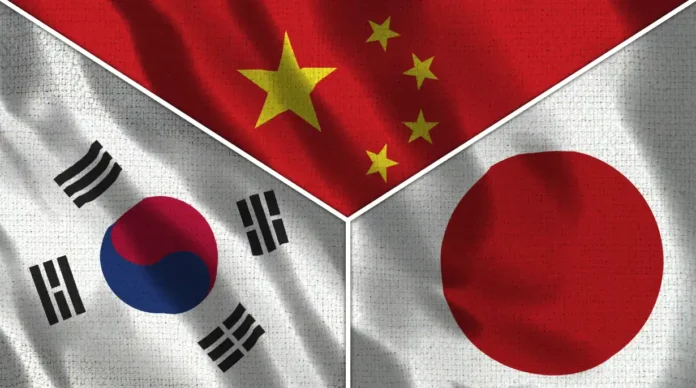In a high-stakes diplomatic dance, the leaders of China, Japan, and South Korea recently convened for a much-anticipated trilateral summit, seeking to navigate the treacherous waters of regional tensions and economic uncertainties. As the three economic powerhouses of Northeast Asia, their ability to find common ground and chart a path forward holds significant implications for the stability and prosperity of the entire region.

The Backdrop: Strained Relations and Shifting Alliances
The trilateral meeting, the first of its kind in over four years, took place against a backdrop of deteriorating relations between the three nations. Decades-old historical grievances, territorial disputes, and strategic rivalries have created a complex web of challenges that have strained diplomatic ties and hampered economic cooperation.
The China-U.S. Rivalry
Underlying these tensions is the intensifying geopolitical competition between China and the United States, the latter being the primary military ally of both Japan and South Korea. As China seeks to expand its global influence, the U.S. has responded by strengthening its alliances in the Asia-Pacific, fueling concerns in Beijing about the formation of a containment bloc.
Regional Security Flashpoints
Volatile regional security issues, such as the Taiwan Strait tensions and North Korea’s nuclear ambitions, have further complicated the dynamics between the three nations. China’s assertiveness in the South China Sea and its growing military cooperation with Russia have also heightened anxieties in Tokyo and Seoul, leading them to deepen their security ties with Washington.
The Summit’s Agenda: Finding Common Ground
Against this backdrop, the trilateral summit in Seoul aimed to navigate the treacherous terrain and find areas of cooperation. The discussions focused on several key areas:
Economic Collaboration
Recognizing their deep economic interdependence, the leaders sought to revive and strengthen economic ties, particularly in areas such as trade, supply chain resilience, and the potential for a trilateral free trade agreement.
People-to-People and Cultural Exchanges
Acknowledging the importance of fostering mutual understanding and goodwill, the three nations agreed to promote increased people-to-people and cultural exchanges, with 2025 and 2026 designated as the “Years of Cultural Exchange.”
Shared Challenges
The summit also addressed common challenges facing the three countries, such as aging populations, emerging infectious diseases, and environmental concerns, with a commitment to collaborate on these pressing issues.
Navigating the Thorny Security Issues
However, the summit was not without its thorny security-related discussions. China’s unease over Japan and South Korea’s deepening security ties with the United States was palpably evident, as Premier Li Qiang issued a veiled rebuke against the perceived formation of blocs and camps.
The North Korea Conundrum
Adding to the complexity, the summit was briefly overshadowed by North Korea’s announcement of a planned satellite launch, which the U.N. views as a thinly veiled test of long-range missile technology. While South Korea and Japan strongly condemned the move, China’s response was more measured, calling for restraint and a political solution.
The Taiwan Factor
Another sensitive issue on the agenda was the situation surrounding Taiwan, with Japan expressing concerns over China’s military assertiveness in the Taiwan Strait. However, Premier Li Qiang refrained from directly addressing these concerns, instead emphasizing the need for the three nations to handle “sensitive issues and points of difference” with care.
Balancing Competing Interests
The summit’s outcomes underscored the delicate balancing act the three nations must perform as they navigate the web of regional tensions and global power dynamics. While economic cooperation and cultural exchanges were the primary focus, the unresolved security issues cast a long shadow over the proceedings.
Maintaining Strategic Autonomy
China’s call for “strategic autonomy” and opposition to the formation of blocs suggests its desire to preserve its influence and counter the perceived encirclement by the U.S. and its allies. This stance, however, clashes with Japan and South Korea’s deepening security ties with Washington, creating a complex diplomatic tightrope.
The Geopolitical Tug-of-War
The trilateral summit highlighted the geopolitical tug-of-war unfolding in the region, as the three nations grapple with the need to balance their economic interdependence with their divergent security interests and alliances. Navigating this delicate equilibrium will be crucial for maintaining regional stability and prosperity.
The Path Forward: Pragmatism and Compromise
Despite the daunting challenges, experts believe the mere resumption of the trilateral summit is a positive sign, indicating the three nations’ recognition of the importance of dialogue and cooperation. Moving forward, a pragmatic and compromise-driven approach will be essential to make tangible progress.
Leveraging Economic Interdependence
The three countries’ deep economic ties, with China being the largest trading partner for both Japan and South Korea, provide a strong incentive for pragmatic collaboration. Capitalizing on this interdependence could pave the way for incremental progress on thornier issues.
Fostering Incremental Trust-Building
Gradual, trust-building measures, such as the agreed-upon “Years of Cultural Exchange,” can help create a more conducive environment for addressing sensitive security concerns. Establishing new communication channels and strengthening existing ones will be crucial in this regard.
Balancing Competing Interests
Ultimately, the success of the trilateral partnership will hinge on the three nations’ ability to strike a delicate balance between their economic imperatives, security considerations, and geopolitical aspirations. Compromise and a willingness to find mutually acceptable solutions will be the keys to navigating this complex landscape.

Conclusion: Charting a Path Amidst Uncertainty
The China-Japan-South Korea trilateral summit was a testament to the region’s enduring economic and cultural ties, as well as the formidable challenges that threaten to undermine regional stability. As the three nations navigate this uncertain geopolitical terrain, their ability to find common ground and forge pragmatic solutions will be crucial not only for their own prosperity but also for the broader peace and security of Northeast Asia.




